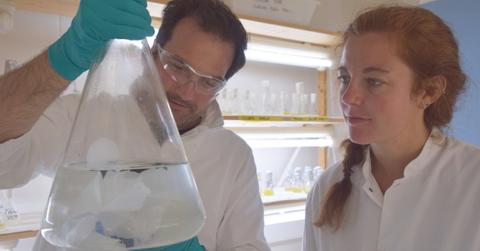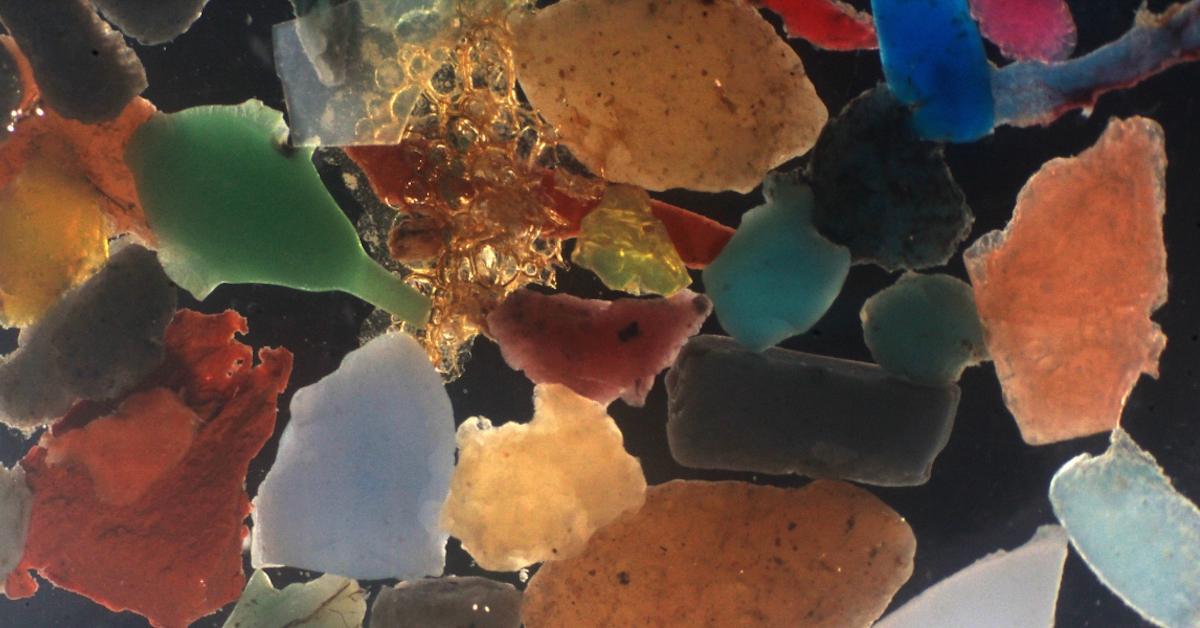Scientist Discovers a Plastic-Eating Bacteria That Actually Digests Plastic Pollution
Updated Jan. 25 2023, 2:32 p.m. ET

Helge Niemann and Maaike Goudriaan in the lab
Plastic pollution is a major issue here on Earth, as well as a significant component of the climate crisis. In response to the disaster that is plastic pollution, scientists have been getting quite creative in recent years — and a recent study details the discovery and application of a plastic-eating bacteria.
Though it will take much more than this to truly rid our natural world of plastic, the secret ability of this bacteria is an exciting and promising finding. Keep reading for the details.

Plastic particles about 2 mm large
A plastic-eating bacteria can convert ocean plastic into CO2.
In January 2023, the Royal Netherlands Institute for Sea Research (NIOZ) published a new study, looking at the bacterium Rhodococcus ruber.
The lead researcher, PhD student Maaike Goudriaan, conducted this lab experiment as a model study, in which she treated a special plastic (containing a certain type of carbon, known as 13C) with a UV lamp (acting as sunlight) in a bottle of artificial seawater. The sunlight helped partially break down the plastic into smaller chunks that bacteria would more likely be able to eat.
Then, she fed the light-treated plastic to the bacteria — and this resulted in the special form of carbon appearing as CO2 above the water.
Essentially, Goudriaan found that the bacterium Rhodococcus ruber "eats and actually digests plastic," turning plastic into CO2 and other substances.
As ScienceDaily notes, previous research has already determined that Rhodococcus ruber can create a biofilm on plastic in a natural setting, and that the plastic beneath the biofilm can then disappear.
However, "This is the first time we have proven in this way that bacteria actually digest plastic into CO2 and other molecules," Goudriaan stated, as per ScienceDaily. "But now we have really demonstrated that the bacteria actually digest the plastic."
This is undeniably a thrilling discovery; that said, Goudriaan asserted that "this is certainly not a solution to the problem of the plastic soup in our oceans." As per her findings, the bacteria can only break down around 1 percent of the plastic it is fed "into CO2 and other harmless substances."
The next step in this research will be applying this model study in nature, to see if the bacteria could actually be used to eat plastic in the wild. Goudriaan has conducted a few informal experiments on this, and they "[hint] at plastic being degraded, even in nature."
But overall, Goudriaan believes that "much better than cleaning up, is prevention. And only we humans can do that."
Other studies have looked at how bacteria can be used to break down plastic.
As mentioned above, this is not the first study to look at the ways the bacterium Rhodococcus ruber — or other bacterium, for that matter — can potentially break down plastic. For instance, in April 2021, Hong Kong Polytechnic University published the results of a study, in which they used the bacterium Pseudomonas aeruginosa to successfully break down microplastics in a lab.
They used the bacterium to create a bacterial biofilm, which the scientists then used to create sticky microbe nets, which were placed in water filled with microplastics. The biofilm nets managed to trap the microplastics and sink them together, and the researchers were successfully able to extract the microplastics from the water.
The NIOZ research builds upon research like that and takes it to the next level, since Rhodococcus ruber actually eats the plastic.
Overall, we'll need a robust combination of both efforts to remove plastic from our natural waterways and efforts to reduce humanity's dependence on plastic (and therefore new plastic pollution in the environment). Hopefully research will only continue to grow on these topics so that we can truly fight plastic pollution.